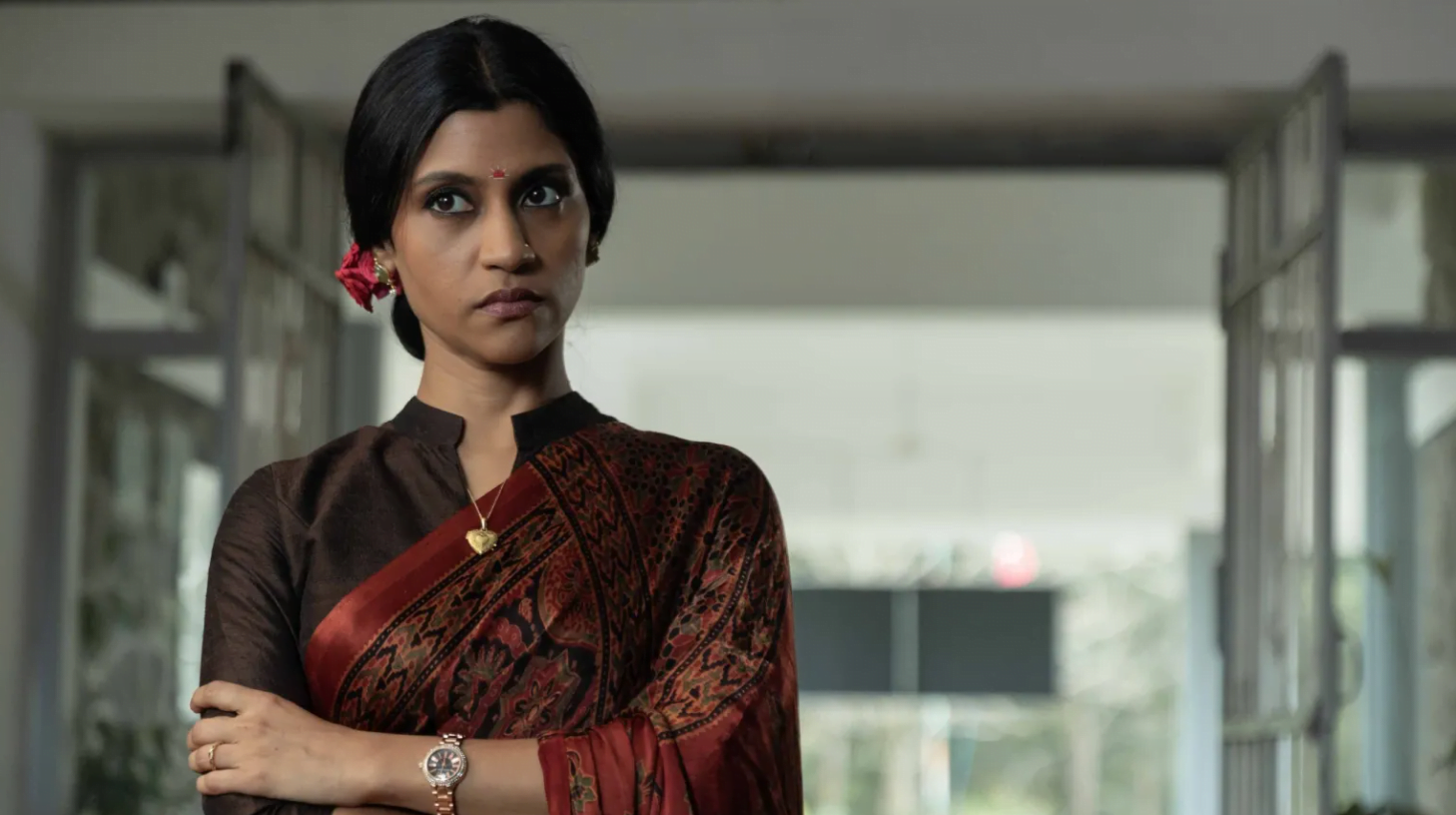Spoilers ahead!
Director Abhishek Chaubey’s Killer Soup (2024) is equal parts dark comedy and crime thriller. Ripe with poetry, theatre and cinematic references, the series also displays a proclivity for gore, violence, and absurdity. As rightfully remarked by one of the characters in the last episode, the story consists of all villains and no heroes.
Initial plot and setting
The fog-shrouded, fictional hill-town of Mainjur located in Tamil Nadu serves as the eerie backdrop for a ghastly course of events to follow. Swathi (Konkona Sen Sharma) and Prabhakar or ‘Prabhu,’ (Manoj Bajpayee) are a married couple whose relationship appears to be cordial on the surface but there is resentment simmering under the surface.
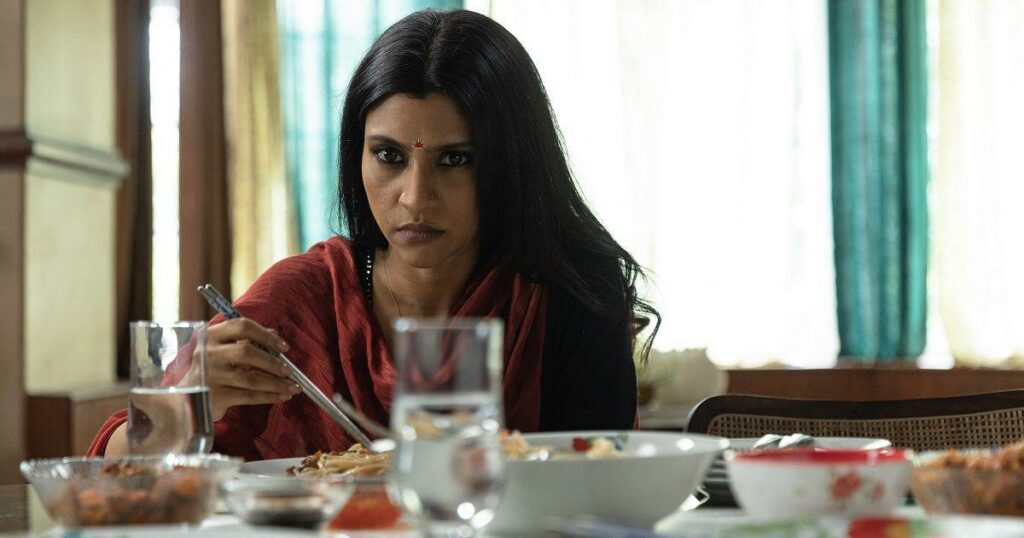
Both of them also keep secrets from the other – Prabhakar, who is being blackmailed for embezzling funds from his brother Arvind (Sayaji Shinde) has hired a private detective to figure out the identity of the blackmailer. Later, it is also discovered that he has been involved in an extramarital affair with his assistant, Kirtima (Kani Kusruti).
Swathi has her amorous adventures with her lover Umesh (Manoj Bajpayee in a double role) and the two have seemingly pursued a long-standing sexual relationship. Umesh is also Prabhakar’s masseur, and it is revealed that he is the one blackmailing him, unbeknownst to Swathi. He also has debts due to a gambling problem and keeps borrowing money from Swathi under the pretext of not being able to make rent.
This is how deception becomes one of the major themes in the Killer Soup early on – no one ever knows who they can trust.
Despite having a single-minded ambition to open her restaurant one day, Swathi is depicted to be a terrible cook. Her paya soup always smells funky and she is unable to get it right, no matter how hard she tries. To rectify this she secretly attends cooking classes, wearing a burqa to conceal her identity, under a khansama who refuses to give her the secret ingredient to make the paya taste right.
The ‘killer’ soup thickens
On one of the nights when she is leaving her cooking class, she discovers that the detective hired by Prabhakar is trailing her. During an altercation where Swathi tries to snatch the camera away from him, he loses control of his car and slides down to the middle of the street where a truck rams into his vehicle. This is the first death of the series, the first of many to follow as the metaphorical soup begins to thicken.
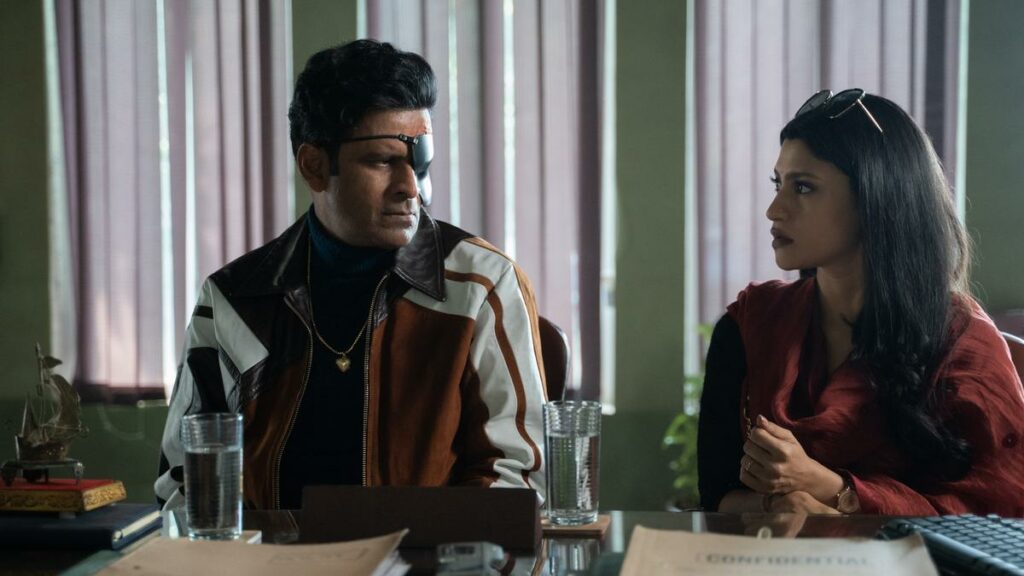
Swathi flees the scene with the camera, which has evidence of her relationship with Umesh. She meets with him at her house and the two fret over further course of action. Chaos ensues as Prabhu makes an earlier-than-expected arrival at the house and Umesh hides under their bed. When Prabhu is asleep, she coaxes Umesh to sneak out of the house, only for him to declare his love for her and suggest that they should run away together. Swathi does not reciprocate his feelings and says their situation is complicated because he cannot give her the life of monetary luxury that she has with her husband.
Prabhu wakes up eventually and finds the camera by the side of his bed. Livid with rage, he attacks both Swathi and Umesh but Umesh knocks him unconscious with a bat and he eventually dies. This is where Swathi’s agency starts taking centre stage, moving away from her role as a docile homekeeper.
She takes charge and the duo dispose of Prabhu’s body in the middle of a forest. Because Prabhu and Umesh are lookalikes, she devises a plan to pass off Umesh as her husband. She opts to ‘reconstruct,’ one side of Umesh’s face with diluted sulphuric acid to conceal his squinted eye, but Umesh accidentally pours concentrated acid on his face which causes permanent disfiguration.
Back at the site of the detective’s death, we are introduced to the police team that will investigate the matter further. Enthusiastic ASI Thupalli (Anbu Thasan) and Constable Asha (Shilpa Mudbi) are led by old and jaded Inspector Hassan (Nassar).
Why, paya soup?
The paya soup is a thread that runs throughout the Killer Soup, symbolic of Swathi’s need for social stature and respect, the thing that matters the most to her. Battered and humiliated by most male characters throughout the series, she continues to fight for her rightful place in her family and society. But no matter how hard she tries, she can’t seem to get it right, becoming more and more embroiled in the trappings of death and deceit.
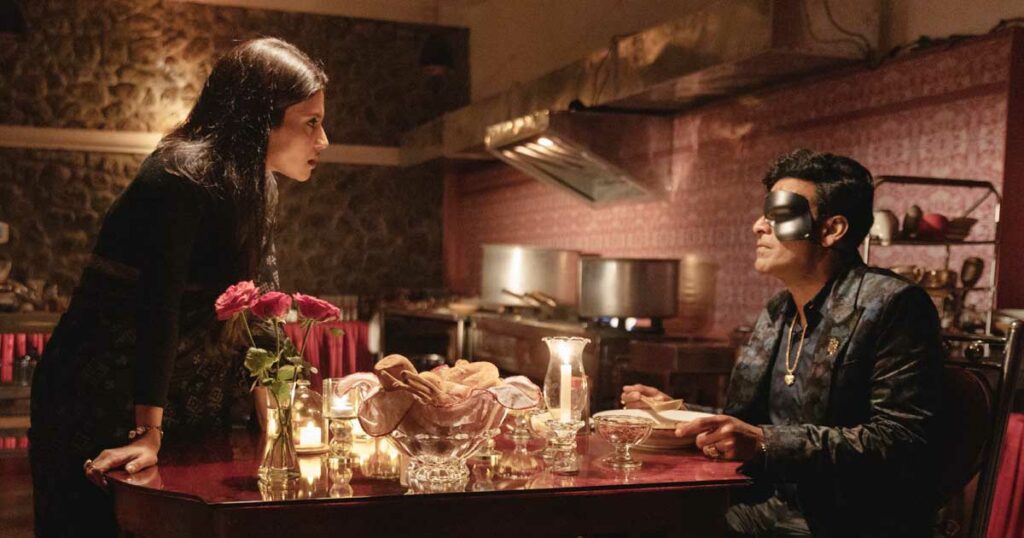
Despite Swathi’s failings, Killer Soup is also a tale of female ambition, resilience and solidarity. From the beginning, she is shown to have a strong bond with her niece Apeksha or ‘Appu,’ (Anula Navlekar). Swathi supports her decision to go abroad to study art even as Appu’s father Arvind does not approve of these plans.
At one point Appu confesses to Swathi that even though she is like a mother to her, unlike Swathi, Appu herself cannot make sacrifices and wait around for things to happen. Instead, she wants to work actively to make her dreams come true. The two then ally to take on the patriarch of the house, Arvind, and extort money from him for Swathi’s dream restaurant and Appu’s dream college.
After Arvind’s death, Appu assumes responsibility for his business and estate. She acknowledges that her father was never fair to Swathi and makes good on her promise of helping her set up her restaurant. This is how Swathi and Apeksha empower and uplift each other throughout the series.
What else is the ‘Killer Soup’ about?
‘Ghosts of the past,’ is a recurring trope in the series. After the accidental demise of ASI Thupalli, Inspector Hassan is haunted by hallucinations and visions of him – mirroring his guilt and helplessness about the loss. In a scene where Umesh and Swathi realise that they are still being blackmailed over the money that Prabhu had syphoned, Umesh remarks how he feels that Prabhu’s ghost is following and haunting them even from his afterlife. Arvind keeps seeing visions and flashes of his late wife whenever he is confronted to tell the truth about her – how she died because of his negligence.
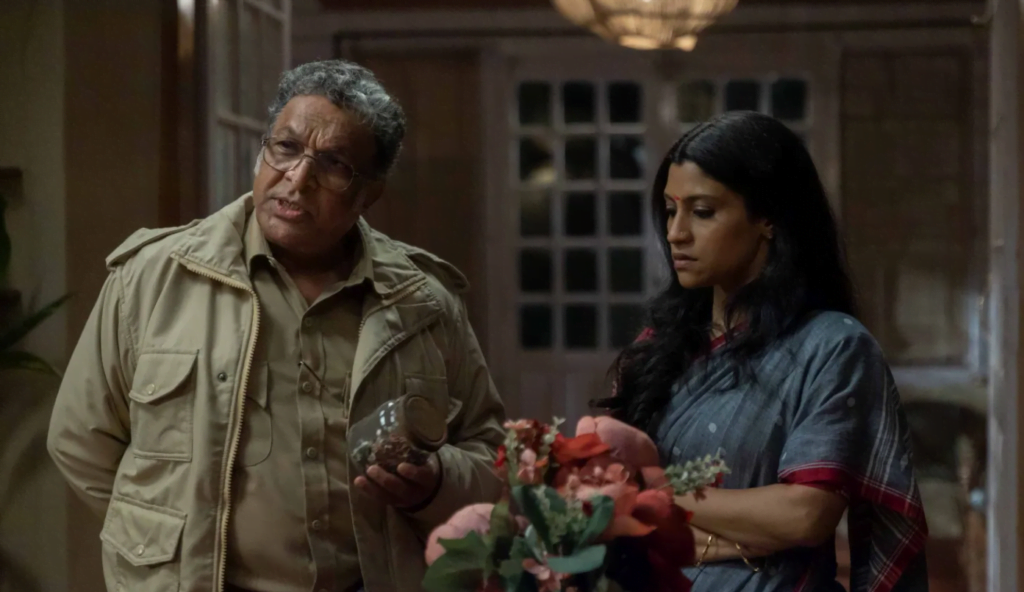
Poetry becomes the vehicle that drives the murder investigations in Killer Soup. Thupalli’s poetry book ‘The Stoic Heart,’ becomes an embodiment of his soul and Hassan’s guide. Verses from poets such as Robert Frost, Emily Dickinson and Marcel Proust serve as clues to key discoveries and revelations within the investigation.
The relationship between Swathi and Umesh keeps evolving throughout the series. Initially, they are lovers, meeting in secrecy. After Prabhu’s death, Swathi becomes more and more resolute to vanquish whosoever threatens to take away her status quo. Umesh on the other hand, pretending to be Prabhu, becomes more and more guilt-ridden due to the death toll that starts racking up. He starts abusing alcohol as a way of coping. Even though both Swathi and Umesh, accuse the other of ‘using,’ for their gains, it is difficult to say who the victim is. Their relationship turns toxic as they start keeping more and more secrets from one another. It almost mirrors Swathi’s relationship with Prabhakar himself.
Deconstructing the end
The secret ingredient that finally makes Swathi’s soup taste delicious is revealed to her by the khansama towards the end – a seasoning made from mushrooms growing on dead and decaying animals in the forest. Parallely, Swathi’s short-lived success in the final episode, her shiny new restaurant Diamant de Mainjur, stemmed from death and deceit as well.
In the same episode, when Umesh throws up violently due to excessive consumption of the mushroom powder, he is rushed to the hospital in the police car. But by the time they reach the hospital, he mysteriously vanishes from the vehicle. Swathi decides to jump off a cliff after she has been exposed, and begins to drown in the Mainjur river. Almost miraculously, she seems to start swimming her way out of the water and is shown to board an empty bus where Umesh is waiting for her.
The conclusion of the series is ambiguous – it seems like Umesh and Swathi have escaped the police. Another interpretation of this scene could reveal that the bus represents the realm of the afterlife where they are the only two passengers, finally boarding a bus out of Mainjur, something that Umesh kept pining for throughout the series. Thupalli rides the bus with them, sitting on the roof and reciting verses about life and despair from Shakespeare’s Macbeth– “It is a tale told by an idiot, full of sound and fury, signifying nothing.”
About the author(s)
Divyani is a media and research professional with a background in critical cultural theory. Her core interest areas are digital cultures, sexuality, and mental health. She loves annoying her cat and a good cup of coffee.
